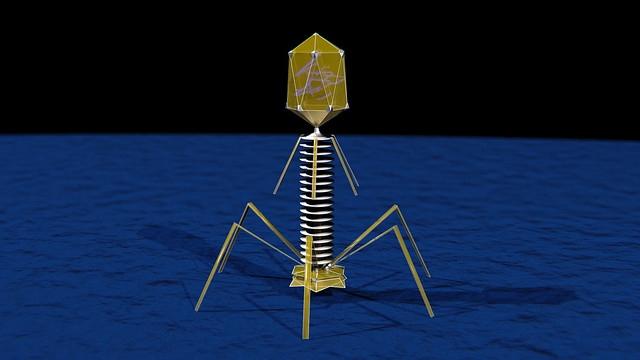Written by Ekta Patel

In the early 1920s, William Twort and Felix d’Herelle co-discovered bacteriophages, also known as phages. These are viruses that can infect and kill bacteria and can be found everywhere bacteria exist such as inside plants, animals, the soil and oceans. The concept of using phages to treat disease-causing bacterial infections was used to fight the bubonic plague outbreak on a Caribbean island. Now almost 100 years later, this idea of using viruses is making a comeback to treat life-threatening infectious bacterial disease in humans and more importantly for exploring its use in the fight against bacteria that are resistant to antibiotics and to reduce the risk of developing and spreading antibiotic-resistant bacteria. This issue is a global public health concern that falls under the broader umbrella of what is termed as antimicrobial resistance (AMR).
Scientists at the International Livestock Research Institute (ILRI) are looking at using phages to kill strains of bacteria that are known to cause disease in poultry farms in Kenya. In Kenya, agriculture contributes towards 26% of the gross domestic product (GDP), and poultry farming represents 30% of the total agricultural GDP. Kenya has an estimated poultry population of 31 million birds, of this 75 % are indigenous chickens, 22% of broilers and layers and 1% of breeding stock. Several diseases affect poultry farming and pose a risk to the health of the farmers and consumers, such as salmonellosis, caused by Salmonella bacteria which are responsible for foodborne infections. Antibiotics are widely used in the poultry farms in Kenya to treat or prevent Salmonella infection, improve growth rates and feed efficiency of chickens. However, this is contributing to the emergence of antibiotic resistance and is a growing concern in Salmonella. Alternatives to antibiotics are urgently needed for the control of these bacteria.
A collaborative project between the Laval University in Canada, and ILRI, funded through Canada’s International Development Research Centre (IDRC) and the UK government’s Global AMR Innovation Fund managed by the Department of Health and Social Care (DHSC), hope to find alternatives to antibiotics by using phages. The lead scientist, a Canadian virologist, Nicholas Svitek says “it will be very critical to identify and use the best phages that will target the correct bacterial population. We are very excited to be working on such a project and grateful for donors and partners to be able to facilitate such research’.
The research team aims to develop a mixture of different phages to improve protection against the Salmonella strains affecting poultry in Kenya with a view that such new alternative therapies to antibiotics will be adopted by the Kenyan poultry industry.
For more information on the project and application of phage in the news see below:
- IDRC announcement on the funding
- Scientists have found an alternative to antibiotics for treating bacterial infections in green sea turtles
- Scientists are killing superbugs with viruses
#AMR #AMRhub #phage #bacteriophage